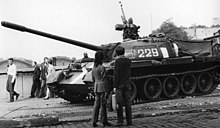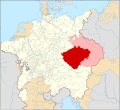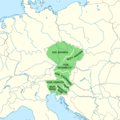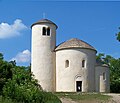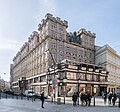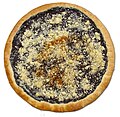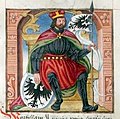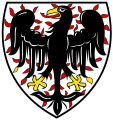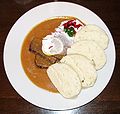Portal:Czech Republic
Welcome to the Czech Portal!
Vítejte na Českém portálu!

|

|

| |
The Czech Republic, also known as Czechia, and historically known as Bohemia, is a landlocked country in Central Europe. The country is bordered by Austria to the south, Germany to the west, Poland to the northeast, and Slovakia to the southeast. The Czech Republic has a hilly landscape that covers an area of 78,871 square kilometers (30,452 sq mi) with a mostly temperate continental and oceanic climate. The capital and largest city is Prague; other major cities and urban areas include Brno, Ostrava, Plzeň and Liberec.
The Duchy of Bohemia was founded in the late 9th century under Great Moravia. It was formally recognized as an Imperial Estate of the Holy Roman Empire in 1002 and became a kingdom in 1198. Following the Battle of Mohács in 1526, all of the Lands of the Bohemian Crown were gradually integrated into the Habsburg monarchy. Nearly a hundred years later, the Protestant Bohemian Revolt led to the Thirty Years' War. After the Battle of White Mountain, the Habsburgs consolidated their rule. With the dissolution of the Holy Roman Empire in 1806, the Crown lands became part of the Austrian Empire.
In the 19th century, the Czech lands became more industrialized; further, in 1918, most of the country became part of the First Czechoslovak Republic following the collapse of Austria-Hungary after World War I. Czechoslovakia was the only country in Central and Eastern Europe to remain a parliamentary democracy during the entirety of the interwar period. After the Munich Agreement in 1938, Nazi Germany systematically took control over the Czech lands. Czechoslovakia was restored in 1945 and three years later became an Eastern Bloc communist state following a coup d'état in 1948. Attempts to liberalize the government and economy were suppressed by a Soviet-led invasion of the country during the Prague Spring in 1968. In November 1989, the Velvet Revolution ended communist rule in the country and restored democracy. On 31 December 1992, Czechoslovakia was peacefully dissolved, with its constituent states becoming the independent states of the Czech Republic and Slovakia.
The Czech Republic is a unitary parliamentary republic and developed country with an advanced, high-income social market economy. It is a welfare state with a European social model, universal health care and free-tuition university education. It ranks 32nd in the Human Development Index. The Czech Republic is a member of the United Nations, NATO, the European Union, the OECD, the OSCE, the Council of Europe and the Visegrád Group. (Full article...)
Selected article -
On 20–21 August 1968, the Czechoslovak Socialist Republic was jointly invaded by four fellow Warsaw Pact countries: the Soviet Union, the Polish People's Republic, the People's Republic of Bulgaria, and the Hungarian People's Republic. The invasion stopped Alexander Dubček's Prague Spring liberalisation reforms and strengthened the authoritarian wing of the Communist Party of Czechoslovakia (KSČ).
About 250,000 Warsaw Pact troops (afterwards rising to about 500,000), supported by thousands of tanks and hundreds of aircraft, participated in the overnight operation, which was code-named Operation Danube. The Socialist Republic of Romania and the People's Republic of Albania refused to participate. East German forces, except for a small number of specialists, were ordered by Moscow not to cross the Czechoslovak border just hours before the invasion, because of fears of greater resistance if German troops were involved, due to public perception of the previous German occupation three decades earlier. 137 Czechoslovaks were killed and 500 seriously wounded during the occupation. (Full article...)
Selected picture

Photographer: Julian Herzog (Creative Commons Attribution 4.0 International)
In this month
- 11 December 1949 – The Číhošť miracle takes place: during a church service of Josef Toufar in the village of Číhošť, the crucifix moves several times over the pulpit, prompting an intervention by the StB
- 15 December 1230 – Wenceslaus I succeeds Ottokar I as King of Bohemia
- 16 December 1992 – The Czech National Council adopts the Constitution of the Czech Republic
- 18 December 1935 – Edvard Beneš is elected second President of Czechoslovakia
- 22 December 1966 – Construction begins on the Stalin Monument (pictured), the largest representation of Stalin in the world
Categories
Selected biography -
Tomáš Rosický (Czech pronunciation: [ˈtomaːʃ ˈrosɪtskiː]; born 4 October 1980) is a Czech former professional footballer who was the captain of the Czech Republic national team for a ten-year period. He played club football for Sparta Prague, Borussia Dortmund and Arsenal. Currently, he serves at the sports director of Sparta Prague.
A midfielder, he started his professional career at his hometown club Sparta Prague, playing three seasons in the Czech First League before moving to Borussia Dortmund in 2001 for DM 25 million (approximately £8 million), at the time a record transfer fee paid by a Bundesliga club. In his first season in Germany, he helped his team win the league title and reach the 2002 UEFA Cup Final. Rosický joined Arsenal in 2006, and made 247 appearances for the club, including appearing in their victory in the 2014 FA Cup Final. He spent a total of ten seasons in the Premier League, affected by several long-term injuries. (Full article...)
Did you know?

- ...that the Sedlec Ossuary is a chapel decorated with the bones of 40,000 people?
- ... that in 2013, the Czech Republic plans to directly elect its president for the first time in its history?
- ... that footballer Petr Vrabec won six Czechoslovak league titles with Sparta Prague?
- ... that Czech actress Anna Letenská was killed by the Nazis for her alleged participation in the assassination of Reinhard Heydrich?
General images
Related portals
Topics

Czech lands: Bohemia • Moravia • Czech Silesia
History: Únětice culture • Boii • Marcomanni • Samo • Great Moravia • Přemyslid dynasty • Lands of the Bohemian Crown • Czech lands (1526–1648) • 1648–1867 • 1867–1918) • Czechoslovakia • Czech Republic
Geography: Lakes • Protected areas • Regions • Rivers
Law: Judiciary • Law enforcement • Supreme Court of the Czech Republic
Politics: Administrative divisions • Government • Constitution • Elections • Foreign relations • Army • Parliament • Political parties • President • Prime Minister
Economy: Banks • Czech koruna • Energy • Oil and gas deposits • Stock Exchange • Tourism • Transport
Culture: Architecture • Art • Cinema • Cuisine • Demographics • Education • Language • Literature • Media • Music • Philosophy • Prostitution • Public holidays • Religion • Sport • Television • Video games
Symbols: Flag • Coat of arms • National anthem (Kde domov můj)
Lists: Outline of the Czech Republic • List of Czech Republic–related topics
WikiProjects
Featured and good content
Things to do
Wikimedia
The following Wikimedia Foundation sister projects provide more on this subject:
-
Commons
Free media repository -
Wikibooks
Free textbooks and manuals -
Wikidata
Free knowledge base -
Wikinews
Free-content news -
Wikiquote
Collection of quotations -
Wikisource
Free-content library -
Wikiversity
Free learning tools -
Wikivoyage
Free travel guide -
Wiktionary
Dictionary and thesaurus


